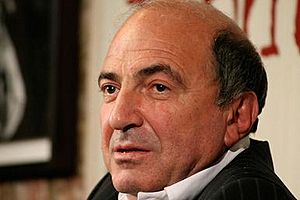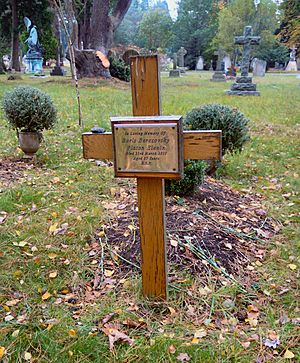Boris Berezovsky (businessman) facts for kids
Quick facts for kids
Boris Berezovsky
|
|
|---|---|
| Борис Березовский | |
 |
|
| Born | 23 January 1946 |
| Died | 23 March 2013 (aged 67) Sunninghill, Berkshire, England
|
| Resting place | Brookwood Cemetery, Brookwood, Surrey, England |
| Other names | Platon Elenin |
| Citizenship |
|
| Occupation |
|
| Spouse(s) |
Nina Korotkova
(m. 1970; div. 1991)Galina Besharova
(m. 1991; div. 2010) |
| Partner(s) | Yelena Gorbunova (esp. 1996; sep. 2012) |
Boris Abramovich Berezovsky (Russian: Борис Абрамович Березовский; 23 January 1946 – 23 March 2013), also known as Platon Elenin, was a Russian business oligarch, government official, engineer and mathematician and a member of the Russian Academy of Sciences.
Contents
Early life
Boris Abramovich Berezovsky was born in 1946, in Moscow, to Abram Markovich Berezovsky (1911–1979), a Jewish civil engineer in construction works, and his wife, Anna Aleksandrovna Gelman (22 November 1923 – 3 September 2013). He studied applied mathematics, receiving his doctorate in 1983.
After graduating from the Moscow Forestry Engineering Institute in 1968, Berezovsky worked as an engineer from 1969 until 1987. He served as assistant research officer, research officer and finally the head of a department in the Institute of Control Sciences of the USSR Academy of Sciences. Berezovsky conducted research on optimization and control theory, publishing 16 books and articles between 1975 and 1989.
Business and political career
Berezovsky made his fortune in Russia in the 1990s, when the country implemented privatization of state property. He profited from gaining control over assets, including the country's main television channel, Channel One. In 1997, Forbes estimated Berezovsky's wealth at US$3 billion. Berezovsky helped fund Unity, the political party that would form Vladimir Putin's first parliamentary base, and was elected to the Duma on Putin's slate in the 1999 Russian legislative election. However, following the Russian presidential election in March 2000, Berezovsky went into opposition and resigned from the Duma. Berezovsky would remain a vocal critic of Putin for the rest of his life.
In late 2000, after the Russian Deputy Prosecutor General demanded that Berezovsky appear for questioning, he did not return from abroad and moved to the UK, which granted him political asylum in 2003. After he moved to Britain, the Russian government took over his television assets, and he divested from other Russian holdings. In Russia, Berezovsky was later convicted in absentia of fraud and embezzlement. The first charges had been brought during Primakov's government in 1999. Despite an Interpol Red Notice for Berezovsky's arrest, Russia repeatedly failed to obtain the extradition of Berezovsky from Britain; the situation became a major point of diplomatic tension between the two countries.
In 2012, Berezovsky lost a London High Court case he brought over the ownership of the major oil producer Sibneft, against Roman Abramovich, in which he sought over £3 billion in damages. The court concluded that Berezovsky had never been a co-owner of Sibneft.
Personal life
Boris Berezovsky had three wives. He divorced his first wife Nina in 1991 to marry Galina, whom he divorced in 2011. His third wife was named Elena Gorbunova. Each of his three wives gave birth to two children.
Death
Berezovsky was found dead in his home, Titness Park, at Sunninghill, near Ascot in Berkshire, on 23 March 2013. A post-mortem examination found that his death was consistent with hanging and that there were no signs of a violent struggle. However, the coroner at the inquest into Berezovsky's death later recorded an open verdict.
Berezovsky was buried on 8 May 2013 in a private ceremony at Brookwood Cemetery in Surrey. The burial timing had been changed on several occasions to try to avoid interest from the Russian media.
Publications by Berezovsky
Berezovsky was a doctor of technical sciences and author of many academic papers and studies such as "Binary relations in multi-criteria optimizations" and "Multi-criteria optimization: mathematical aspects". In the mathematical review index MathSciNet, B.A. Berezovsky is credited with 16 publications from 1975 to 1989 on operations research and mathematical programming, earning 9 citations in other publications. Most cited is the book The Problem of Optimal Choice with A.V. Gnedin (Nauka, Moscow 1984), devoted to secretary problems.
Aside from his academic publications, he frequently authored articles and gave interviews; these are collected in The Art of the Impossible (3 vols.). He continued to contribute articles while in exile, taking a highly critical view of Russia's political leaders.
See also
 In Spanish: Borís Berezovski (empresario) para niños
In Spanish: Borís Berezovski (empresario) para niños


